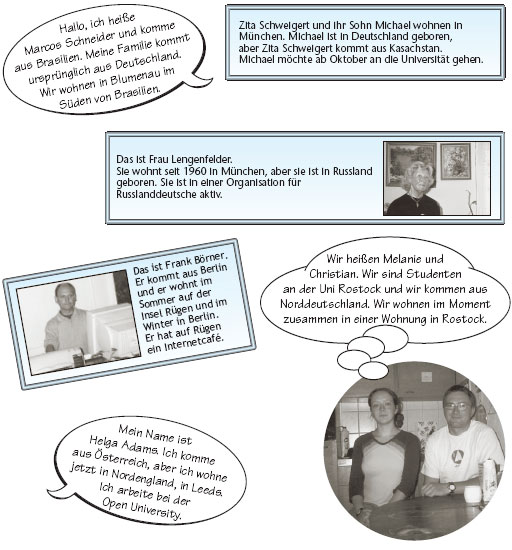3.2 Where do you live?
In the previous sections, you learned about personal pronouns when talking about one person or one thing only (the singular). Below is a list of all pronouns, singular and plural. You came across some of them in the audio extracts and when reading the introductions in Übung 17.
Personal pronouns
| Singular | Plural | Singular and plural |
|---|---|---|
|
ich – I du – you (when talking to a close friend, a relative or a child) er – he sie – she es – it |
wir – we ihr – you (when talking to two or more close friends, relatives or children) sie – they | Sie – (when talking to one or more adults who are not very close friends or relatives of yours) |
Note that sie with a small ‘s’ means ‘she’ and also ‘they’.
You will have noticed that there are different ways of saying ‘you’ in German. Sie is the most useful when you meet German-speaking people. You mainly use Sie throughout this course, but you also learn more about the different ways of addressing people later on.
Übung 18
You also need to know how to use verbs with pronouns in the plural. The table below shows all the forms for kommen. ‘komm-’ is the stem of the verb that is always the same. Endings are then added according to who you are talking about. Like kommen the verb wohnen is regular. They both work in the same way. Write down the forms for wohnen. The first one has been done for you.
Bitte schreiben Sie die Formen von „wohnen“ in die Tabelle.
| kommen | wohnen | ||
|---|---|---|---|
| singular | ich | komme | wohne |
| du | kommst | ||
| er/sie/es | kommt | ||
| plural | wir | kommen | |
| ihr | kommt | ||
| sie | kommen | ||
| singular and plural | Sie | kommen |
Answer
Here are the forms of wohnen:
| wohnen |
|---|
| ich wohne |
| du wohnst |
| er/sie/es wohnt |
| wir wohnen |
| ihr wohnt |
| sie wohnen |
| Sie wohnen |
Übung 19
Listen to the audio extracts and practise the different forms of wohnen.
Hören Sie und sprechen Sie. Hier ist ein Beispiel.
Sie hören: ich
Sie sagen: ich wohne
Sie hören: ich wohne
Transcript: Übung 19
Übung 20
Use the information from Übung 17 (repeated below), to match the answers with the questions in the following activity.

- Vokabeln
- Wo wohnen Sie? Where do you live?
- Wo wohnt er/sie? Where does he/she live?
Using the following two lists, match each numbered item with the correct letter.
Er wohnt in Blumenau.
Sie kommen aus Norddeutschland.
Sie kommt aus Russland.
Er wohnt in Berlin und auf der Insel Rügen.
Sie wohnt in München.
Sie wohnt in Leeds.
a.Woher kommen Melanie und Christian?
b.Wo wohnt Frau Adams?
c.Wo wohnt Marcos Schneider?
d.Wo wohnt Herr Börner?
e.Wo wohnt Frau Schweigert?
f.Woher kommt Frau Lengenfelder?
- 1 = c
- 2 = a
- 3 = f
- 4 = d
- 5 = e
- 6 = b
Übung 21
Match the questions and answers below. You will need to look closely at both the grammar and the content.
Using the following two lists, match each numbered item with the correct letter.
Er kommt aus der Schweiz.
Er kommt aus Österreich.
Sie kommt aus Österreich.
Sie wohnen in Pennsylvania.
Sie wohnt in München.
Sie wohnen in Rostock.
Sie wohnen in München.
Er kommt aus Brasilien
a.Woher kommt Wilhelm Tell?
b.Woher kommt Wolfgang Amadeus Mozart?
c.Wo wohnt Frau Lengenfelder?
d.Wo wohnen Zita und Michael Schweigert?
e.Wo wohnen die Amish?
f.Woher kommt Marcos Schneider?
g.Woher kommt Frau Adams?
h.Wo wohnen Melanie und Christian?
- 1 = a
- 2 = b
- 3 = g
- 4 = e
- 5 = c
- 6 = h
- 7 = d
- 8 = f
Übung 22
In this activity, listen to the audio to practise giving some personal information about the people you have come across in this section. Make sure you are familiar with the information given in the extracts in Übung 17, then answer the questions.
Bitte hören Sie und sprechen Sie. Hier ist ein Beispiel.
Sie hören: Entschuldigen Sie bitte, wie ist Ihr Name? (Lengenfelder)
Sie sagen: Mein Name ist Lengenfelder.
Sie hören: Wo wohnen Sie?
Sie sagen: Ich wohne in München.
Sie hören: Und woher kommen Sie?
Sie sagen: Ich komme aus Russland.
Transcript: Übung 22
Abschnitt 12
Bitte hören Sie und sprechen Sie.
Dialogue 1
Dialogue 2
Dialogue 3
Dialogue 4
